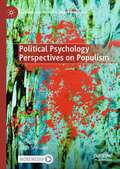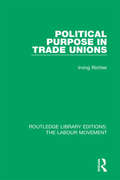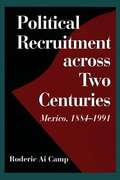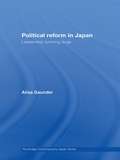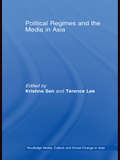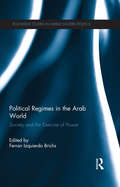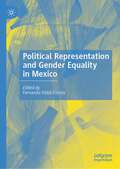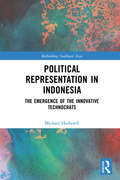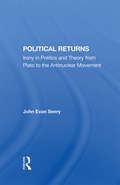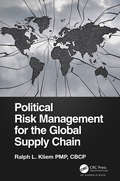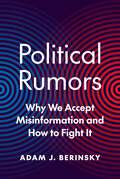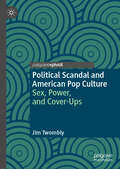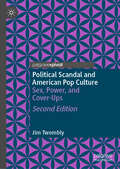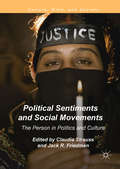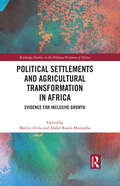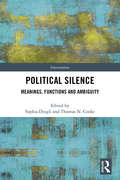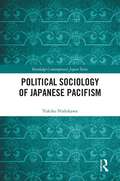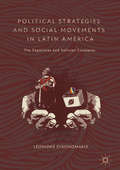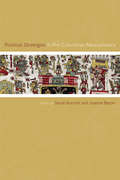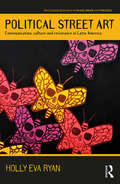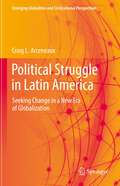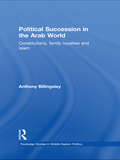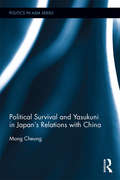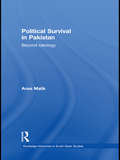- Table View
- List View
Political Psychology Perspectives on Populism (Palgrave Studies in Political Psychology)
by Gilda SensalesThis book explores the different forms of populism in European countries. Starting from a theoretical point of view, the authors outline the various psychosocial precursors of populisms that have emerged from empirical investigations. Using both mainstream and critical perspectives, the book shows how the field has driven multiple research programmes and methodologies. The authors draw on questionnaires and political communication via social media to analyse the opinions, attitudes, and representations of laypeople and populist leaders. The volume is aimed at researchers, students, and readers with expertise on the subject. It collects contributions from scholars of social psychology, proposing an innovative reading of the social-cognitive, motivational, and emotional processes that can fuel populism.
Political Purpose in Trade Unions (Routledge Library Editions: The Labour Movement #26)
by Irving RichterFirst published in 1973. In this study of trade union political activity in the period since 1945, the author demolishes much of the original rhetoric and inherited wisdom to provide an alternative insight on the entire subject of unions in politics. For his study the author has chosen to examine, in detail, the political interests and activities of a representative group of British unions, while an extended chapter makes a comparative assessment of the American experience. This title will be of interest to scholars and students of history and politics.
Political Recruitment across Two Centuries: Mexico, 1884-1991
by Roderic Ai CampDuring more than twenty years of field research, Roderic Ai Camp built a monumental database of biographical information on more than 3,000 leading national figures in Mexico. In this major contribution to Mexican political history, he draws on that database to present a definitive account of the paths to power Mexican political leaders pursued during the period 1884 to 1992. Camp's research clarifies the patterns of political recruitment in Mexico, showing the consequences of choosing one group over another. It calls into question numerous traditional assumptions, including that upward political mobility was a cause of the Mexican Revolution of 1910. Comparing Mexican practices with those in several East Asian countries also allows Camp to question many of the tenets of political recruitment theory. His book will be of interest to students not only of Mexican politics but also of history, comparative politics, political leadership, and Third World development.
Political Reform in Japan: Leadership Looming Large (Routledge Contemporary Japan Series #Vol. 12)
by Alisa GaunderPolitical Reform in Japan argues that the quality of political leadership is the crucial determinant of whether parties in positions of dominance, like the Liberal Democratic Party in Japan, pass or reject policies such as electoral system and campaign finance reforms that could harm the party's future electoral chances. By comparing successful reform drives led by Miki Takeo, Ozawa Ichiro and Koizumi Junichiro with unsuccessful reform efforts pursued by Kaifu Toshiki, Miyazawa Kiichi and Kono Yonhei, Alisia Gaunder forces a reconsideration of the structure versus agency debate in political science, and of the conventional wisdom on Japanese politics that consensus decision-making norms and factional power balancing produce little in the way of political leadership.
Political Regimes and the Media in Asia (Media, Culture and Social Change in Asia)
by Terence Lee Krishna SenThis book analyzes the relationship between political power and the media in a range of nation states in East and Southeast Asia, focusing in particular on the place of the media in authoritarian and post-authoritarian regimes. It discusses the centrality of media in sustaining repressive regimes, and the key role of the media in the transformation and collapse of such regimes. It questions in particular the widely held beliefs, that the state can have complete control over the media consumption of its citizens, that commercialization of the media necessarily leads to democratization, and that the transnational, liberal dimensions of western media are crucial for democratic movements in Asia. Countries covered include Burma, China, Indonesia, Malaysia, Singapore, Thailand, the Philippines and Vietnam.
Political Regimes in the Arab World: Society and the Exercise of Power (Routledge Studies in Middle Eastern Politics)
by Ferran Izquierdo BrichsOne of the implications of Orientalism is that the Arab world, as a homogenous entity, is often analysed as an anomaly within the international system. This book argues that, despite their differences, societies across the globe ultimately construct their own history according to very similar dynamics and tensions. The methodological approach of this book, using different countries within the Arab world as models, offers the reader an analysis of relations between the elites and their opposition in a variety of settings. A definition of the political structure of each country is drawn from this analysis before potential future scenarios, as according to country specific experts, are proposed. This model provides a useful contribution to students and scholars of political science and international relations. Through providing a comparative study of the political regimes currently operating in the Arab world; their elites, civil society, power resources and political resistance, this book illustrates that despite the image of homogeneity sometimes portrayed by the Arab world, it is the multiplicity of models and heterogeneity of regimes that constitute reality.
Political Representation and Gender Equality in Mexico
by Fernanda Vidal-CorreaThe field of gender and politics has continuously grown, becoming more interdisciplinary and engaging with issues, context and people from all around the world. Because of this, new emerging approaches and studies challenge embedded notions, ideas and preconceptions of how the world is meant to be studied and understood. It is particularly true for studies on women and their engagement in political affairs. How should institutions conceptualize women in order to advance rules and mechanisms that favor women? What roles do representatives have on the making of gender equality? When women are legislating, which are the consequences of the approved legislation?
Political Representation in Indonesia: The Emergence of the Innovative Technocrats (Rethinking Southeast Asia)
by Michael HatherellThis book analyses the transformation of political representation in contemporary Indonesia to argue the need to better understand how political representatives use claims to engage in storytelling about themselves and the community they represent. By adopting a new approach that focuses on the cultural and performative aspects of representation and draws on a substantive evidence base of representative claims, this book examines common narratives developed by Joko Widodo, Tri Rismaharini, Basuki Tjahaja Purnama, Ridwan Kamil and Nurdin Abdullah. Through this analysis, the book highlights two key foundations of their claims: technocratic focus and innovative engagement. This study considers how the ideational power generated through the representative claim-making of these leaders interacts and competes with other forms of power. Moreover, the author emphasises the success of the representative claims developed by the innovative technocrats, while noting the impact their emergence has had on the broader context of Indonesian politics. An empirical monograph on new and upcoming leaders in Indonesia, this book will be of interest to scholars of democracy and democratisation and political change in general, and Southeast Asian politics and Indonesian politics in particular.
Political Returns: Irony In Politics And Theory From Plato To The Antinuclear Movement
by John Evan SeeryThis book presents a theory of the politics of irony and tests this theory through readings of political theory texts and through an analysis of the politics of the contemporary anti-nuclear movement, and argues that political writing must be ironic.
Political Risk Management for the Global Supply Chain
by Ralph L. KliemThe global business environment has never been so complex, making supply chains more fragile than ever. A stable business environment seems like a distant dream in today's global marketplace; instability, not stability, has become the norm. Anti-globalization and nationalization, coupled with populist movements and transnational terrorism, just to name a few targeting global supply chains, now pose significant challenges and risks when doing business across the globe. To address such issues, Political Risk Management for the Global Supply Chain: Provides an overview of basic political terminology and political risk management Presents the basic processes of political risk management Examines the current and future impacts of political events on global supply chains By putting aside the passions that politics can raise, the book aims to objectively look at political risk management. Topics covered include: Identifying different categories of political risk Understanding the relationship of political risk management, enterprise risk management, supply chain, project management, change management, and business continuity Laying the groundwork for efficient and effective political risk management Evaluating the effectiveness of responses The book begins with an overview on why political risk management is an important yet overlooked topic and the corresponding consequences if it is ignored or overlookedby enterprises and their global supply chains. Next, it provides systemic and systematic perspectives on political risk management and explains why the topic is more important than ever. Most important, it provides a framework that enterprises, regardless of nationality, can use to develop and deploy to manage political risks. The book concludes by discussing the full spectrum of developing, deploying, testing, and maintaining processes to conduct political risk management.
Political Rumors: Why We Accept Misinformation and How to Fight It (Princeton Studies in Political Behavior #18)
by Adam J. BerinskyWhy debunked political rumors persist and how to combat themPolitical rumors and misinformation pollute the political landscape. This is not a recent phenomenon; before the currently rampant and unfounded rumors about a stolen election and vote-rigging, there were other rumors that continued to spread even after they were thoroughly debunked, including doubts about 9/11 (an “inside job”) and the furor over President Obama’s birthplace and birth certificate. If misinformation crowds out the truth, how can Americans communicate with one another about important issues? In this book, Adam Berinsky examines why political rumors exist and persist despite their unsubstantiated and refuted claims, who is most likely to believe them, and how to combat them.Drawing on original survey and experimental data, Berinsky shows that a tendency toward conspiratorial thinking and vehement partisan attachment fuel belief in rumors. Yet the reach of rumors is wide, and Berinsky argues that in fighting misinformation, it is as important to target the undecided and the uncertain as it is the true believers. We’re all vulnerable to misinformation, and public skepticism about the veracity of political facts is damaging to democracy. Moreover, in a world where most people simply don’t pay attention to politics, political leaders are often guilty of disseminating false information—and failing to correct it when it is proven wrong. Berinsky suggests that we should focus on the messenger as much as the message of rumors. Just as important as how misinformation is debunked is who does the debunking.
Political Scandal and American Pop Culture: Sex, Power, and Cover-Ups
by Jim TwomblyThis book provides a newer definition of political scandal and applies it in a way to remove “ordinary corruption” from the discussion. It then defines pop culture and examines how scandal and pop culture interact. The discussion addresses the question: when does a scandal actually enter into our pop culture. The mechanisms or vehicles by which this occurs include editorial cartoons, Broadway shows, music, movies, television, and more. The first chapter lays out the two main definitions and gives a bit of historical background to the discussion that follows. Chapters 2 through 8 deal with scandals from Watergate to the Trump Administration and from presidents to members of Congress and governors. Chapter 9 ties all of the previous discussion together and makes an assessment of the contemporary state of scandal and pop culture.This book works well as a supplement in a course on American Government, in American Studies, and is aimed at a wide range of readers from college freshmen to more advanced scholars and political junkies.
Political Scandal and American Pop Culture: Sex, Power, and Cover-Ups
by Jim TwomblyThis book provides a newer definition of political scandal and applies it in a way to remove “ordinary corruption” from the discussion. It then defines pop culture and examines how scandal and pop culture interact. The discussion addresses the question: when does a scandal actually enter into our pop culture. The mechanisms or vehicles by which this occurs include editorial cartoons, Broadway shows, music, movies, television, and more. The first chapter lays out the two main definitions and gives a bit of historical background to the discussion that follows. This new edition builds on the previous book with analysis of January 6th, George Santos, allegations of election fraud, and Rudy Giuliani. This book works well as a supplement in a course on American Government, in American Studies, and is aimed at a wide range of readers from college freshmen to more advanced scholars and political junkies.
Political Science and Chinese Political Studies
by Sujian GuoWe have witnessed the substantial transformation of China studies, particularly Chinese political studies, in the past 30 years due to changes in China and its rising status in the world as well as changes in our ways of conducting research. As area studies specialists, we are no longer "isolated" from the larger disciplines of Political Science and International Relations (IR) but an integral part of them. This book contains theoretically innovative contributions by distinguished political scientists from inside and outside China, who together offer up-to-date overviews of the state of the field of Chinese political studies, combines empirical and normative researches as well as theoretical exploration and case studies, explore the relationship between Western political science scholarship and contemporary Chinese political studies, examine the logic and methods of political science and their scholarly application and most recent developments in the study of Chinese politics, and discuss the hotly-contested and debated issues in Chinese political studies, such as universality and particularity, regularity and diversity, scientification and indigenization, main problems, challenges, opportunities and directions for the disciplinary and intellectual development of Chinese political studies in the context of rising China.
Political Sentiments and Social Movements: The Person In Politics And Culture (Culture, Mind, And Society Ser.)
by Claudia Strauss Jack R. FriedmanThis unique volume is about how ordinary people construct political meanings, form political emotions and identities, and become involved in or disengaged from political contests. Drawing on psychological anthropology, it illustrates the complexities of political subjectivities through engaging personal stories that complicate our understanding of the relationship between culture and politics. Chapters examine the Tea Party and Occupy Wall Street in the United States, third gender activism in India, Rastafari in Jamaica, Courage to Refuse in Israel, the environmental movement in the U.S., Salafi movements in northern Nigeria, post-socialist labor politics in Romania, and anti-immigrant activism in Denmark.
Political Settlements and Agricultural Transformation in Africa: Evidence for Inclusive Growth (Routledge Studies on the Political Economy of Africa)
by Martin Atela Abdul Raufu MustaphaThis book explores the ways in which political settlements can contribute to positive changes in Africa’s agricultural and manufacturing sectors. Contemporary Africa has seen many governments, donors, and commercial private enterprises supporting innovative agricultural and agro-processing schemes with the purpose of diversifying economies. However, many of the schemes collapse or at best fail to generate the needed jobs. Focusing on case studies in Kenya, Nigeria and Ethiopia, this book takes an interdisciplinary approach that combines econometric modelling research, life histories, policy approaches methods, and political economy theory to reframe the field with new questions. The contributors offer alternative explanations for the failure of employment creation schemes in Africa and show how political settlements can bring together stakeholders to settle on win-win approaches to productive employment schemes and inclusive development. Providing new insights on the political economy of agrarian and labour relations in Africa, this book will be of interest to policy actors and development practitioners wishing to support inclusive growth in Africa, as well as to scholars of African politics and economics, public policy and development.
Political Silence: Meanings, Functions and Ambiguity (Interventions)
by Sophia Dingli Thomas N. CookeThe notion of ‘silence’ in Politics and International Relations has come to imply the absence of voice in political life and, as such, tends to be scholastically prescribed as the antithesis of political power and political agency. However, from Emma Gonzáles’s three minutes of silence as part of her address at the March for Our Lives, to Trump’s attempts to silence the investigation into his campaign’s alleged collusion with Russia, along with the continuing revelations articulated by silence-breakers of sexual harassment, it is apparent that there are multiple meanings and functions of political silence – all of which intersect at the nexus of power and agency. Dingli and Cooke present a complex constellation of engagements that challenge the conceptual limitations of established approaches to silence by engaging with diverse, cross-disciplinary analytical perspectives on silence and its political implications in the realms of: environmental politics, diplomacy, digital privacy, radical politics, the politics of piety, commemoration, international organization and international law, among others. Contributors to this edited collection chart their approaches to the relationship between silence, power and agency, thus positing silence as a productive modality of agency. While this collection promotes intellectual and interdisciplinary synergy around critical thinking and research regarding the intersections of silence, power and agency, it is written for scholars in politics, international relations theory, international political theory, critical theory and everything in between.
Political Sociology of Japanese Pacifism (Routledge Contemporary Japan Series)
by Yukiko NishikawaWhile Japanese pacifism is usually seen as a national policy or an ideology rooted in the provision of Article 9 of the Japanese Constitution, it cannot be adequately understood without grasping Japanese social discourses on peace, war and justice. The perspective of political sociology provides a more in-depth understanding of Japanese pacifism and helps us to find the reasons for the critical changes that have occurred in Japan’s policies since the mid-2000s. These changes include sending its self-defense force to Iraq and Afghanistan outside UN missions and the enactment of new security legislation in 2015. Nishikawa explores Japanese pacifism in a changing domestic and regional context, from the perspective of political sociology. Getting to grips with the social bases of politics, she examines whether Japan is likely to remain a pacifist country or retain its pacifist image in changing regional and global context. This book comprehensively examines Japanese pacifism by fully examining the social forces in action. Employing a multidisciplinary approach, the book contributes to theoretical debates on political sociology as well as Japanese and Asian studies. Japan is in an important transitional period and Japanese pacifism is being brought into question in changing national and international contexts.
Political Strategies and Social Movements in Latin America: The Zapatistas and Bolivian Cocaleros
by Leonidas OikonomakisThis book investigates how social movements form their political strategies in their quest for social change and -when they shift from one strategy to another- why and how that happens. The author creates a model which distinguishes between two different roads to social change: one that passes through the seizure of state power and one that avoids any relationship with the state. Comparing the cases of two Latin American social movements, the Zapatistas in Mexico and the Bolivian Cocaleros, the volume argues that strategic choices are often decided upon through similar mechanisms. Ideal for a scholarly and non-specialist audience interested in Mexican and Bolivian politics, revolutions, and Latin American and social movement studies.
Political Strategies in Pre-Columbian Mesoamerica
by Sarah Kurnick and Joanne BaronPolitical authority contains an inherent contradiction. Rulers must reinforce social inequality and bolster their own unique position at the top of the sociopolitical hierarchy, yet simultaneously emphasize social similarities and the commonalities shared by all. Political Strategies in Pre-Columbian Mesoamerica explores the different and complex ways that those who exercised authority in the region confronted this contradiction. New data from a variety of well-known scholars in Mesoamerican archaeology reveal the creation, perpetuation, and contestation of politically authoritative relationships between rulers and subjects and between nobles and commoners. The contributions span the geographic breadth and temporal extent of pre-Columbian Mesoamerica—from Preclassic Oaxaca to the Classic Petén region of Guatemala to the Postclassic Michoacán—and the contributors weave together archaeological, epigraphic, and ethnohistoric data. Grappling with the questions of how those exercising authority convince others to follow and why individuals often choose to recognize and comply with authority, Political Strategies in Pre-Columbian Mesoamerica discusses why the study of political authority is both timely and significant, reviews how scholars have historically understood the operation of political authority, and proposes a new analytical framework to understand how rulers rule. Contributors include Sarah B. Barber, Joanne Baron, Christopher S. Beekman, Jeffrey Brzezinski, Bryce Davenport, Charles Golden, Takeshi Inomata, Arthur A. Joyce, Sarah Kurnick, Carlo J. Lucido, Simon Martin, Tatsuya Murakami, Helen Perlstein Pollard, and Víctor Salazar Chávez.
Political Street Art: Communication, culture and resistance in Latin America (Routledge Research in Place, Space and Politics)
by Holly Eva RyanRecent global events, including the ‘Arab Spring’ uprisings, Occupy movements and anti-austerity protests across Europe have renewed scholarly and public interest in collective action, protest strategies and activist subcultures. We know that social movements do not just contest and politicise culture, they create it too. However, scholars working within international politics and social movement studies have been relatively inattentive to the manifold political mediations of graffiti, muralism, street performance and other street art forms. Against this backdrop, this book explores the evolving political role of street art in Latin America during the twentieth and early twenty-first centuries. It examines the use, appropriation and reconfiguration of public spaces and political opportunities through street art forms, drawing on empirical work undertaken in Brazil, Bolivia and Argentina. Bringing together a range of insights from social movement studies, aesthetics and anthropology, the book highlights some of the difficulties in theorising and understanding the complex interplay between art and political practice. It seeks to explore 'what art can do' in protest, and in so doing, aims to provide a useful point of reference for students and scholars interested in political communication, culture and resistance. It will be of interest to students and scholars working in politics, international relations, political and cultural geography, Latin American studies, art, sociology and anthropology.
Political Struggle in Latin America: Seeking Change in a New Era of Globalization (Emerging Globalities and Civilizational Perspectives)
by Craig L. ArceneauxThis book discusses in an accessible way how emerging globalizing processes are setting the stage for new forms of social and political struggle in Latin America, with increased involvement of multilateral and foreign actors, and impacts of global political populism and populist social media. These are opening up new strategies and opportunities for activists, and offer new arenas of contestation for international organizations. The book analyzes the struggles of select marginalized groups, specifically the urban poor, indigenous groups, women's and LGBTQ groups, and the vulnerable middle classes. Each case is examined in the context of a distinct struggle for citizenship, identity, inclusion, and or the rule of law. The study offers a broad historical analysis of the region through the context of these struggles. It tackles some of the most pressing issues surrounding the current politics of Latin America, including identity politics, cultural appropriation, social mobilization and protest, neoliberal reform, reproductive rights and sexual autonomy, corruption, the influence of religion and patriarchy, crime and social justice, inequality and poverty, the informal economy, and urban exclusion. In doing so, it details not only how these are not new struggles, but also how they have evolved over time. In the contemporary period, the book explores how the actors as well as character of their struggle are changing through a globalized interchange of ideas and processes. The book covers a wide geographical area in Latin America, with a particular focus on countries with Spanish or Portuguese colonial backgrounds, and is for researchers, students and laypersons interested in new globalizing forces affecting Latin American society and polity.
Political Succession in the Arab World: Constitutions, Family Loyalties and Islam (Routledge Studies in Middle Eastern Politics)
by Anthony BillingsleyPolitical succession is a key issue in the contemporary Middle East. In this new study the author examines the process and shows how respect for those in authority and tribal codes of loyalty have been far more influential in maintaining regimes than security institutions and political repression. The Arab world is faced by political turmoil and demands for reform. Many of the problems of the region are attributed to the form of leadership that dominates the area, leadership that is authoritarian and focused on regime survival rather than political change. The book highlights the ways in which family loyalties pervade political, economic and social life and how constitutions are being used to consolidate the power of ruling families in republics and monarchies. The volume explores the notion that the region’s rulers, monarchic and republican, are inclined to pass their power on to their sons, and evaluates the use they make of family and tribal networks to maintain their power. The work sees to demonstrate that despite economic and social problems, Arabs value stability and prefer an authoritarian family-based regime than government run by Islamist groups. Providing new insights into the influences on political succession in the Middle East, this work will be of great interests to scholars of Middle East studies, history and international relations.
Political Survival and Yasukuni in Japan's Relations with China (Politics in Asia)
by Mong CheungWhat role does the political survival of prime ministers play in Japan’s relations with China over the Yasukuni issue? Three Japanese prime ministers, including Nakasone Yasuhiro, Hashimoto Ryutaro and Abe Shinzo, complied with China’s demands and stopped visiting the controversial Shrine in 1986, 1997 and 2007, respectively. By contrast, the Yasukuni controversy intensified between 2001 and 2006 when a popular Prime Minister Koizumi Junichiro was determined to pay regular homage to the Yasukuni Shrine annually. Prime Minister Abe, who previously demonstrated restraint over the issue in his first term between 2006 and 2007, visited the Yasukuni unexpectedly in 2013 but not in 2014 or 2015. To explain this variation, this book presents an alternative interpretation of Japan’s official responses toward China’s pressure over the Yasukuni issue between 1985 and 2015 by applying a political survival approach that highlights the domestic political legitimacy of the Japanese prime minister or the ruling party. This book will be of great interest to students and researchers of Sino-Japanese relations, Japan’s foreign policy and international relations.
Political Survival in Pakistan: Beyond Ideology (Routledge Advances in South Asian Studies)
by Anas MalikPresenting a framework that incorporates macro-level forces into micro-level strategic calculations, this book explains key political choices by leaders and challengers in Pakistan through the political survival mechanism. It offers an explanation for continuing polity weakness in the country, and describes how political survival shapes the choices made by the leaders and challengers. Using a unique analysis that synthesizes theories of weak states, quasi-states and political survival, the book extends beyond rationalist accounts and the application of choice-theoretical approaches to developing countries. It challenges the focus on ideology and suggests that diverse, religiously and ethnically-defined affinity groups have interests that are represented in particular ways in weak state circumstances. Extensive interviews with decision-makers and polity-participants, combined with narrative accounts, allow the author to examine decision-making by leaders in a state bureaucratic machinery context as well as the complex mechanisms by which dissident affinity groups may support ‘quasi-state’ options. This study can be used for comparisons in Islamic contexts, and presents an interesting contribution to studies on South Asia as well as Political Development.
